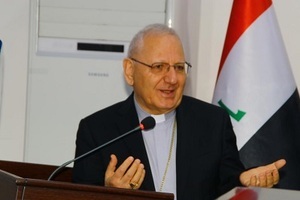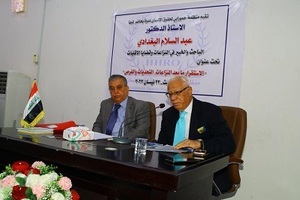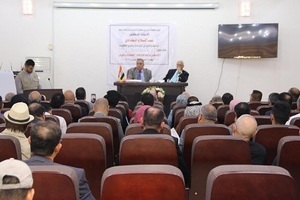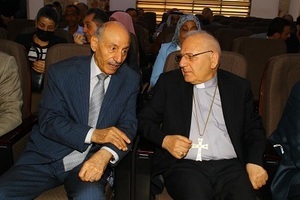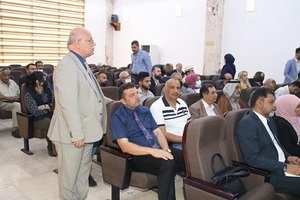
- Hammurabi Human Rights Organization addresses the issue of post-conflict stability in Iraq, challenges and opportunities
- The lecturer Dr. Abdul Salam Al-Baghdadi calls for the establishment of a civilized civic culture.
- Quotas and the sub-cultures do not build a civil and democratic state.
- Establish a culture of peace, achieving harmony between nationalities and religions, and adopt three paths for sustainable human development that Iraq needs.
- The symposium has extensive interventions and discussions on the subject.
Dr. Abdul Salam Al-Baghdadi calls for the establishment of a civilized civic culture to dispel all fears to reach stability in Iraq.
That came in a lecture during a symposium held by Hammurabi Human Rights Organization entitled (post-conflict stability in Iraq, challenges and opportunities) on Saturday, 23 April 2022 at the Sabean Mandaean Manda Hall in Baghdad, which was moderated by Prof. Dr. Hamid Shehab, and attended by a large gathering of Iraqi elites, clerics, academics, researchers, experts and activists, headed by His Beatitude Cardinal Mar Louis Sako, Patriarch of the Chaldean Church in Iraq and the world.
The researcher Dr. Abdul Salam Al-Baghdadi pointed out that the conflict may be due to a civil war or an uprising, following a dictatorial rule or the occupation of a foreign country, and thus it is correct to apply what happened in Iraq as a crisis represented by number of conflicts, adding this phenomenon witnessed not only in Iraq but in other countries such as China, America, Germany, France and number of other countries of the world.
In dealing with the situation in Iraq, the researcher referred to the dictatorial regimes that succeeded from 1958 to 2003 and the wars ensued with neighboring countries and the siege followed, forming after 2003 a political system based on sterile quotas. During 20 years, nothing had improved and national reconciliation did not take its proper path to implementation, as well as the destruction of infrastructure and services and the failure in achieving the defend of Iraq's rights with neighboring countries and other powers .
The researcher confirmed that in the past 20 years there has been a conflict between the Central Government and the Regional over oil, the armed forces, the budget, border crossings, airports and disputed areas, indicating that no real national reconciliation achieved ,still refugees and displayed people not achieving a full transitional justice, there is still a culture of components, sub-cultures that do not build a genuine democratic national civil state, affirming that peace, national unity and sustainable development are essential precursors to the establishment of a national democratic State, stressing that the situation in Iraq needs three paths (establishing the culture of peace based on tolerance, forgiveness and coexistence, achieving harmony between nationalities and religions within the philosophy of neither the winner nor the loser, and the adoption of an effective development policy).
Dr. Abdul Salam Al-Baghdadi made an important point, that paths should be initiated in a participatory process away from the tendencies of quotas and the dedication of sub-cultures. we should not start from above in the construction of the state, but from the basis of the building of society, and hence understand why the political blockage is taking place in the country now.
The lecturer identified the opportunities required to achieve stability in liberating culture from politics, i.e., developing a culture of contribution away from the culture of submission, activate the role of institutions at the expense of personal roles, national subscribers development and adopting their comprehensive historical symbols from Hammurabi through many of these symbols characterized by their patriotism. He also called for establishment of a new socio-political contract through a constitution based on citizenship, equality, and unity of the Iraqi territory based on the ability to assume responsibility within all the courtesies,focusing on the importance of building the middle class because it is the mainstay of positive change and the liberation of women, Dr. Abdul Salam Al-Baghdadi concluded that Iraqi geography is intractable to division and the culture of violence, anger, volatility, sadness and roughness in the Iraqi character, not because of the geographical location, but because of the challenges, calamities and tragedies, the country has passed over history, until today, perpetuated further human rights violations.
An extensive discussion of the views took place enriching the symposium with many ideas to be a guide in action for a comprehensive political reform, which is the real platform of stability
Mrs. Pascale Warda, Chairwoman of Hammurabi Human Rights Organization, expressed sincere thanks and appreciation to Professor Dr. Abdul Salam Al-Baghdadi and Dr. Hamid Shehab for the distinguished attendance and vital participation in the discussions.


